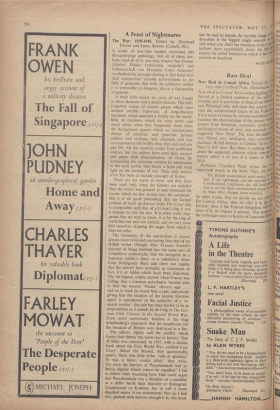A Feast of Nightmares
The War: 1939-1945. Edited by Desmond Flower and James Reeves. (Cassell, 50s.)
A SCORE of war-time leaders commend this thousand-page anthology. Not all of them, per-
haps, read all of it; one may suspect that Grand- Admiral Dtinitz (eminently readable') and Feldmarschall von Manstein (very welcome') overlooked the passages dealing at first hand with their compatriots' notable achievements in the field of genocide. But with the collective verdict it is impossible to disagree; this is a fascinating scrapbook.
It deals with nearly six years of war fought in three elements and a dozen theatres. The half- forgotten names of distant places which once seemed terribly important, of long-obsolete machines which queened it briefly on the battle- field, of incidents which we were never told much about when they happened—these form the background against which an international chorus of admirals and generals, private soldiers and civilians, war criminals and war correspondents tell briefly what they did and saw and felt. All this material comes from published sources, but the editors have used their scissors and paste with discrimination. At times, by juxtaposing the accounts written by adversaries in the same action, they throw a fresh and vivid light on the fortunes of war. Their only serious error has been to include passages of fiction.
There are not many of these; and they have been used 'only when the Editors are satisfied that the writer was present at and witnessed the events which he has woven into his narrative.' But. it is no good pretending that the factual content of (say) an extract from The Cruel Sea is comparable with that of a U-boat's log; it was a mistake to mix the two. It is what really hap- pened that we want to know, it is for the ring of truth that our ears are cocked; and we very soon find ourselves skipping the pages from which it does not echo.
The testimony of the inarticulate is almost always more vivid and convincing than that of the skilled writer (though Miss Frances Faviell's account of being bombed has the same sort of compulsive authenticity that we recognise in a Japanese soldier's diary or a subaltern's letter from Stalingrad). Here and there one regrets that the editors have included, as statements of
fact, or fables which have been disproved. The old legend, widely current when France was falling, that a German parachutist 'needed only to find the nearest "Pacha" chicory sign . . . and on its back he would find cryptic indications giving him the location of the nearest German agent' is reproduced on the authority of a 're- search worker'; this tale has been shown to be as preposterous as it sounds by de Jong in The Ger- man Fifth Column in the Second World War. Even more notoriously baseless is the thug Schellenberg's statement that his handbooks for the invasion of Britain were destroyed in a fire.
The editors rightly call the conflict which forms their theme 'the worst war in history.' One of them was concerned, in 1937, with a similar book about the First World War, entitled Vain Glory. About the Second, they questionably assert, 'there was little either vain or glorious.' 'It was a bitter, sordid affair,' they write, 'for even the horrors of Passchendaele had an heroic dignity which cannot be equalled.' 1 fail to follow their reasoning here. One could argue that Passchendaele was a bloodier or a muddier or a duller battle than Alamein or Stalingrad. Guadalcanal or Kohima; but to call it more dignified seems to me nonsensical. Nor do I feel that, packed with horrors though it is, this book can be said to tarnish the terrible image of!' Boredom is the biggest single element in and when you distil the boredom from it (35.4 authors have successfully done) the fell retains the awful fascination which it has ales, exerted on mankind.
olf‘






































 Previous page
Previous page